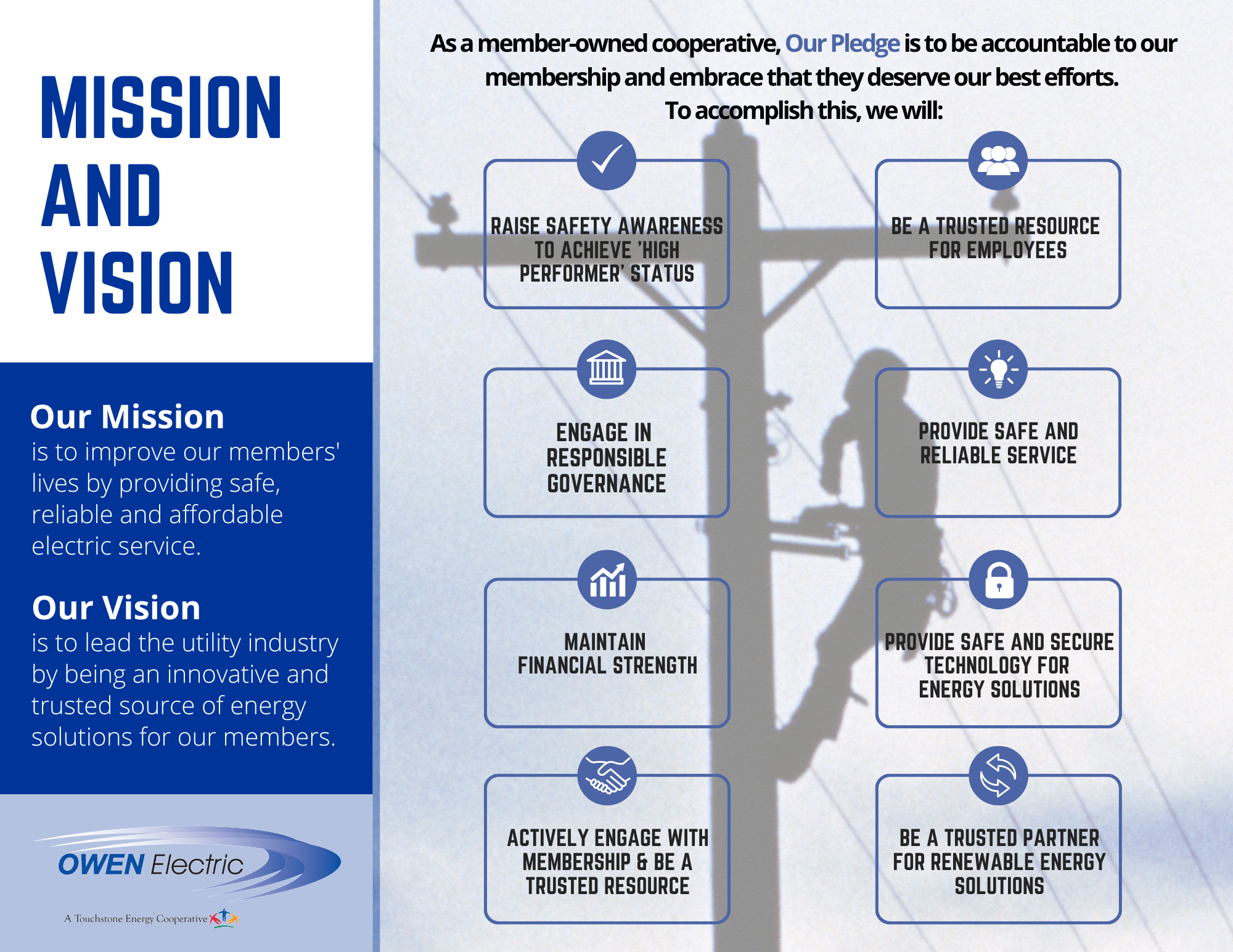Owen Electric Cooperative, Inc. began its mission in providing electric service to the rural residents of Owen County in 1937. Known then as “Owen County Rural Electric Cooperative Corporation (RECC),” its first annual meeting—held June 17, 1937—was attended by five men who, at the time, not only served as Owen Electric’s first Board of Directors, but happened to be its only members, and 52 others interested in electric service.
It was at this meeting, however, that the first bylaws were adopted and a contract with the Rural Electric Association (REA) was signed in the amount of $130,000 for the construction of 130 miles of line to serve approximately 500 applicants in Owen County.
On January 29, 1938, the first of Owen County RECC’s lines were energized during a celebration attended by Governor A.B. ‘Happy’ Chandler. By April 1938, the Board of Directors had voted to include Grant and Gallatin counties in the cooperative’s service area. By June 1938, the Board had voted to extend service into Pendleton County.
By the end of 1939, Owen County RECC members had voted to include Boone, Kenton, Campbell, Carroll and Scott counties in the service area. By 1942, Owen County RECC had 2,440 members.
The end of World War II saw men returning home having served their country and eager to have electricity light up their homes. By the end of 1949, Owen County RECC held a membership of nearly 6,500 throughout its service territory.
Having operated from rented office space for the first few years of the Co-op’s existence, 1951 brought a new office to 510 Main Street in Owenton, a location that would serve as Owen County RECC/Owen Electric Cooperative’s headquarters for the next 52 years.
In the same manner that it brought electricity to its local countryside, Owen Electric continues to be a pioneer in Kentucky, being the first electric utility in the state to promote and sell green power under the label ‘Envirowatts’ in 2001.
Since its inception, Envirowatts has grown to become a significant portion of East Kentucky Power’s renewable energy production. Five landfill gas power plants in Kentucky now generate 15 megawatts of electricity—enough to power about 9,000 homes.
In 2003, with well over 50,000 members throughout its nine-county area, Owen Electric Cooperative moved to a new facility located approximately eight miles north of Owenton on Highway 127. The corporate headquarters and service center was combined and the building was designed with the hopes of meeting the needs of the Co-op’s members for at least the next 50 years.
The year 2006 brought along one of the most technologically innovative changes Owen Electric had undergone, as it began the transition to Automated Metering Infrastructure (AMI). This process included changing from the traditional hand-read mechanical meters to new electronic meters, capable of being read remotely from the Owen Electric headquarters. This eventually eliminated the need for meter readers to travel to each meter to gather readings monthly, saving time and costs for labor and fuel.
More advanced metering and co-op technology has paved the way for more innovative energy conservation programs, including Simple Saver, a direct load control program launched in 2011. GPS mapping has also been incorporated for a more comprehensive mapping of Owen Electric’s system.
No stranger to innovation, Owen Electric also received a federal grant in 2011 from the Department of Energy, to launch an array of ‘Smart Home’ and ‘Smart Grid’ projects. These pilot projects have been instrumental in gathering member and energy data that will be key in developing Owen Electric’s member energy efficiency programs and incentives, as well as shape the co-op’s endeavors to increase power quality and reliability, and increase overall member satisfaction.
PrePay Service, or prepaid metering, allows members to pay in advance of their energy use. The program can be helpful to members for budgeting purposes and being more aware of their energy use. Members participating in PrePay Service receive low balance notifications via text message and can reload their accounts from home as they like.
As of 2025, Owen Electric serves more than 67,000 meters on approximately 4700 miles of line.

